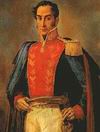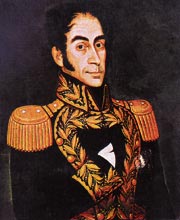Simón Bolívar (1783-1830)
 |
Liberator
of a Continent. A visionary far away from his time, and
a great man of history. Bolívar freed five South
American countries from Spanish colonialism. When you drive
into Mexico from Texas there is a prominent statue of Simon
Bolivar, proclaiming: 'Liberator of the Americas'. A similar
statue is in the Civic Center of The City of San Francisco.
All major parks throughout the five countries that he freed
bear his name: Plaza Bolívar. |
|
The
Plaza Bolívar, in Cartagena, features a large statue
of Simón Bolívar, which documents the historic
importance that Bolivar held for Cartagena. |
"Si
Caracas me dio la vida, Cartagena me dio la gloria"
"If Caracas gave me life, CARTAGENA gave me
glory"
The Last Days Of Simón Bolívar
Franklin W Knight
Wednesday, June 10, 2009 |
On May 8, 1830 Simón Bolívar, the great liberator of most of Spanish South America, finally resigned the presidency of Gran Colombia, reluctantly packed his material possessions in Bogotá and took a river-boat down the Magdalena River to the hot and humid Caribbean port of Cartagena. Bolívar knew that his empire-building days were over. In his heart he still wanted to mould a mighty kingdom of the irredentist Spanish American states. But time was not on his side. |
 |
His mind was still enviably clear and his determination still imposingly strong but his body was severely weakened by a debilitating combination of diseases. He had burned the candle at both ends for far too long. At 47 it was less chronology than high mileage and the relentless wear and tear on a body that had known little rest since the age of 16. He was in the accelerating sunset of his life. His health was failing fast from the combined effects of tuberculosis, malaria, syphilis, and cirrhosis of the liver.
Bolívar wished for a quiet foreign exile in any of his old familiar haunts. He could not be choosy. Either Europe or any Caribbean island would do. All things considered, Europe had been good to him. He retained fond memories of his youth in Spain before circumstances forced him to take up arms fighting for the independence of South America. In Madrid he had married the love of his life, the beautiful aristocrat, María Teresa Rodríguez del Toro y Alayza.
Although she died unexpectedly within a year, she remained the love of his life. A widower at 20, he kept his vow never to marry again. That was not, however, the same as taking a vow of celibacy. |
BOLIVAR... truly a legitimate
hero for all the Americas. |
The ideas of Napoleonic France attracted him very much although he was disappointed in its government. He had travelled to Britain in 1810 as a part of the unsuccessful Venezuelan delegation seeking assistance in the colonial revolt against Bonaparte's decapitation of the Spanish empire. Exile in France, England or Italy could be tolerable since he knew the languages and was familiar with the cultures.
Yet in all his indefatigable wanderings, his fondest memories were probably of the Caribbean, especially of Jamaica, where he had escaped assassination, or of Curaçao and Haiti. Bolívar spent almost a year in Kingston from where he wrote his most celebrated letter. In Haiti early in 1816 Alexandre Pétion gave him the essential military resources to resume his wars of liberation when things were quite gloomy. For that Bolívar promised to abolish slavery throughout South America.
"Among popular and representative systems," he wrote in his famous letter from Jamaica, "I do not favour the federal system. It is over-perfect, and it demands political virtues and talents far superior to our own. For the same reason I reject a monarchy that is part aristocracy and part democracy, although with such a government England has achieved much fortune and splendour. Since it is not possible for us to select the most perfect and complete form of government, let us avoid falling into demagogic anarchy or monocratic tyranny.I say: Do not adopt the best system of government, but the one that is most likely to succeed."
A lot of water had flowed under the bridge since those promising Caribbean days. Bolívar tasted victory and defeat frequently. Between 1819 and 1822 as president of Gran Colombia, an area that comprised Panama, Colombia, Venezuela, and Ecuador, he had defeated royalist armies at Boyacá, Carabobo, and Pichincha. By 1825 the Spanish had been driven from South America and Bolivar even had a country named after him. Descendants of George Washington sent a medal with the Marquis de Lafayette that proclaimed Bolívar "The Second George Washington of the New World".
Yet the difficulty of winning the wars of liberation was exceeded by the impossibility of creating a stable government in the vast area. Venezuela, the country of his birth, split from Gran Colombia. Dissension in Colombia and Ecuador became endemic. Few liked his advocacy of a lifetime presidency and the right to name his successor. Rivals were everywhere and his life was in constant jeopardy. Manuela Sáenz, his long-time mistress, saved Bolívar from an assassination attempt in September 1828. Although he still had admirers and supporters, stable government was not on the political horizon. Bolívar negotiated a handsome pension for himself and abandoned the government, leaving with his faithful aide-de-camp, General Daniel F O'Leary, and a small entourage for what he thought would be a comfortable exile. It was not to be.
The heavy rains and high humidity of Cartagena undermined his poor health. By November it was clear that he could not survive a sea voyage anywhere. A move to Barranquilla improved neither his health nor his mood. Finally he accepted the invitation from a wealthy Spaniard, Don Joaquin de Mier Benitez, to stay at his salubrious hacienda Great House in Santa Marta, modestly called La Quinta de San Pedro Alejandrino.
Established in 1608, the vast property, along the Manzanares River, had 82 slaves and one of the largest rum distilleries in the Caribbean. From his sparsely furnished front room Bolívar received dismal political reports, and vainly tried to salvage his failing health. By December 10 it was obvious that the end was near. He composed his last will, performed the last religious rites, and issued his last declaration to the people of Colombia. "If my death will help end factions to consolidate the Union," he declared, "I shall go to my grave in peace." He wrote no more.
Bolívar died early in the afternoon of December 17, 1830. For several days the embalmed body lay in state in an upper room of the custom's building, and then it was buried in the cathedral. His death failed to bring political unity or stability to the area on which he spent his fortune and gave his life. Nevertheless, Bolívar is truly a legitimate hero for all the Americas. |
|
|

